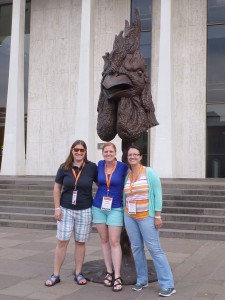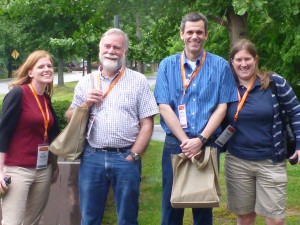
Megan Gall, Kelly Ronald, and Jennie Carr posing with the chicken from the Chinese Zodiac sculpture at Princeton University.
The Gall lab headed to the 2014 Animal Behavior Society Conference at Princeton University this past week. It was a great chance to talk about science, connect with old friends, and learn about where the field is going!
At the conference I (Megan, or Dr. Gall to some of you) got to catch up with some great friends and colleagues, including a friend from grad school (Kelly Ronald), my former Ph.D advisor (Jeff Lucas) and my former master’s advisor (Esteban Fernandez-Juricic). I also got to catch up with some friends (Jennie Carr at Washington College) and even meet some new people that are teaching at liberal arts colleges on the eastern seaboard. We managed to snap the picture below just as the wind picked up and it started to rain!
On the first day of the conference I moderated a session on Neuro/ Physio/ Endo mechanisms of behavior. I gave a talk in this session on how listening to a complex social stimulus (in this case the chorus of a green treefrog) can affect the way the the brain responds to a small portion of that stimulus (a single call). Imagine that your parents played lots of music from the 1960s when you were younger. Now, if you hear a song by the Beatles you (and your brain!) might get excited and you might sing along. However, if your parents only played jazz music, you might not get as excited about a Beatles’ song. We found that frog brains respond the same way. If a frog listens to a chorus for 10 days, its brain responds more to calls than if it listened to random tones for 10 days. Part of the work I presented was done at Georgia State University, where I was a post-doc. The talk also contained data that was collected by undergraduates in the lab (Tymon Dickson and Aaron Kim at Vassar College, Hayley Roberston at GSU) this past year. There was even a little sneak peak at some electrophysiology data that I collected this summer in collaboration with Walt Wilczynski at GSU!


what kind of behavior we can see in the animal?